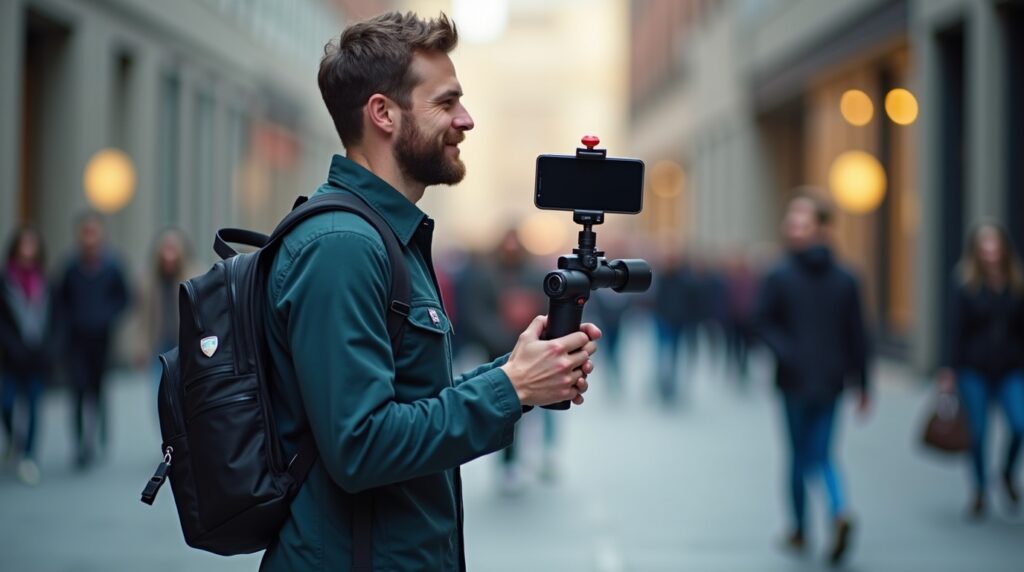Stay Safe, Respectful, and Protected While Streaming On-the-Go
IRL streaming brings the excitement of real life directly to your audience — unfiltered, unscripted, and always live. But while streaming in public is thrilling, it also comes with risks. From safety concerns to legal boundaries, there’s a lot mobile streamers need to navigate.
This guide covers essential IRL streaming safety tips and legal considerations to keep you and your content secure.
🛡️ Why Safety Should Be a Priority for IRL Streamers
Unlike controlled studio environments, IRL streaming puts you in unpredictable situations. Here’s why that matters:
- 📍 You’re sharing your location in real-time: This makes you vulnerable to harassment or being tracked.
- 📸 You’re filming strangers: Consent and local laws come into play.
- 💬 You’re interacting live: No editing or delay means everything — including mishaps — goes out instantly.
Streaming should be fun, but taking precautions helps protect you, your gear, and your community.
🔒 Physical Safety Tips for IRL Streaming
- 🚫 Avoid revealing your exact location: Delay your stream by a few minutes or blur sensitive signage.
- 🧑🤝🧑 Stream with a friend when possible: Especially at night or in unfamiliar areas.
- 🔋 Carry a power bank & backup phone: Stay reachable in emergencies, even if your streaming rig fails.
- 👀 Be aware of your surroundings: Don’t get too absorbed in chat to notice potential dangers.
- 🧢 Use discreet gear: Deter theft by keeping your setup low-profile when not actively streaming.
⚖️ Legal Considerations: What You Can and Can’t Stream
Streaming in public isn’t always legally straightforward. Laws vary widely depending on country and even city.
- 📷 Filming in public spaces: In most regions, it’s legal to film in public — but not always to broadcast individuals without consent.
- 🚷 Private property laws: Malls, stores, restaurants, and transit systems often prohibit filming without permission.
- 👥 Minors and consent: Avoid filming children unless explicitly permitted by a guardian.
- 🔈 Audio recording laws: Some countries require all-party consent for audio recording — even in public.
- 🚔 Comply with law enforcement: If asked to stop filming by an official authority, comply immediately and stay respectful.
💡 Pro tip: Research local laws before traveling to stream in a new city or country.
🌐 Digital Safety & Privacy for Streamers
IRL streamers are also at risk of doxxing, harassment, or swatting — so take your digital safety just as seriously:
- 🧠 Mask identifiable info: Blur house numbers, license plates, ID badges, and QR codes.
- 📱 Use a VPN and strong 2FA: Protect your accounts and stream keys from hijackers.
- 🔐 Set up stream delay if needed: A 30–60 second delay helps avoid trolls reacting in real-time to your location.
- 🧑💻 Limit IRL meetups: If you do them, choose public areas and bring a trusted mod or friend.
🧾 Know Your Rights (and Limits) as a Streamer
- 🎤 Freedom of speech doesn’t cover harassment: Be respectful of boundaries, especially in sensitive settings.
- 🧍 Public doesn’t mean permission: Just because someone is visible doesn’t mean they’ve consented to appear on stream.
- 🛑 Right to disconnect: Anyone who asks not to be filmed should be respected — even if you’re legally allowed to record.
🔄 What to Do If Something Goes Wrong
Despite preparation, issues can still arise. Here’s how to handle them:
- 📞 Emergency? Call local authorities immediately. Prioritize your safety over content.
- 🛠️ Technical issue? Have a secondary device and mobile hotspot ready.
- 🧑⚖️ Legal trouble? Remain calm, comply, and contact a legal advisor after the fact.
- 💬 Harassment on stream? Ban/report offenders, block their access, and alert mods.
🧩 Bonus: Tools That Help Keep You Safe
- 📍 Streamlabs & StreamElements: Include on-screen alerts or panic buttons.
- 🕵️ Blur Tools (like Larix Broadcaster): Mask addresses and sensitive info.
- 🧭 Tracking Apps (like Life360): Let trusted friends monitor your location for safety.
❓ FAQ – IRL Streaming Safety & Legal Issues
It depends. In many places it’s legal, but using their image for profit without consent may not be.
Not without permission — these are private properties with their own policies.
Use a stream delay, avoid obvious landmarks, and don’t show street signs or venue names.
Mute, block, move to a safe area, and report them to platform mods or authorities if needed.
✅ Final Thoughts
IRL streaming should be fun, spontaneous, and engaging — but never at the cost of your safety or others’ privacy. With just a few smart practices and legal considerations, you can protect yourself while continuing to grow your channel and connect with viewers.
Remember: it’s not just about being live — it’s about being safe while you do it.
